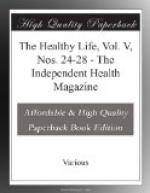sugar. As the starch, if it is to be assimilated,
must be (and as a general rule practically all is)
converted into sugar during digestion, we get from
1 lb. of bread 8 oz. of sugar (to be exact, nearly
9 oz., because starch forms rather more than its
own weight of sugar). But the weight of bread
allowed for daily food, if no other starchy or sugary
food is taken, is—according to orthodox
physiology books—1 lb., 11 oz., yielding
over 14 oz. of sugar. Now I reduce the starchy
food to 8 oz. or less (No Rheumatism, p. 34),
yielding at most about 41/2 oz. of sugar. You
see, then, that the patient can now afford to take
even 2 lbs. of fruit, because this will bring his
total of sugar up to only 63/4 oz., as against 14
oz. allowed by the orthodox. And if, as I recommend
(p. 33), fruits containing but little sugar (especially
cucumbers) are taken, his total sugar under my regime
will be even less than 63/4 oz.
“As so many people fail to distinguish between fruit sugar occurring naturally in fruit and ordinary separated and concentrated cane sugar, or even beet sugar separated by various chemicals—’shop sugar,’ in fact—I translate for you a passage from Dr Carton’s Trois Aliments Meurtriers[20]:—
[20] Some Popular Foodstuffs Exposed,
translated by D.M. Richardson.
1s. net. Daniel.
“’Let us proceed now to the study of the third deadly food. The sugar contained in vegetables and raw fruits is a living aliment, physiologically combined with the protoplasm of the vegetable cells, associated with ferments and with vitalised chemical salts. The absorption of this natural sugar is effected by a harmonious contact, by an exchange of energy between the living vegetable cells and our living digestive cells.
“’The sugar of commerce, on the contrary, is a dead food which has lost all association with vegetable protoplasm, with vitalised mineral salts and with oxidising ferments which would render it physiological. It is nothing more than a drug, a dangerous chemical, because Nature has nowhere presented it to us in this form.... Its absorption involves an anti-physiological irritation which over-excites the viscera, and when repeated ends by profoundly altering them.’”
“This is all very well,” cries Pseudo-Science,
“but people may eat too
much fruit.”
“Certainly, but then I warn them at once,” quoth Taste.
“But they have an idea it is good for
them, and they disregard your
warnings.”
“If they ‘have an idea’ which runs counter to my warnings and my penalties, to say nothing of my promises and my rewards, then they can only get that idea from you, Mr Pseudo-Science, with your theories and your figures and your long words.”
“Why not from your relative, Unnatural
Taste? Anyhow, it is my duty to
warn them.”
“If they don’t heed my warning,
they certainly won’t heed yours,” says
Taste.




